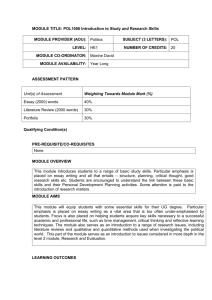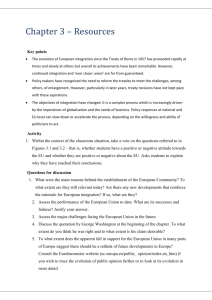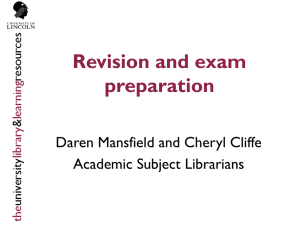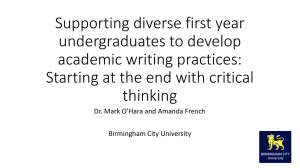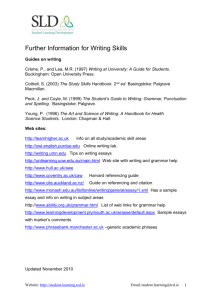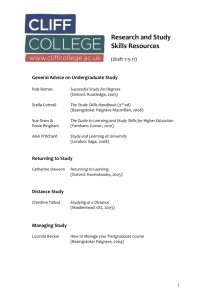MODULE TITLE : POL3015 Dissertation
advertisement
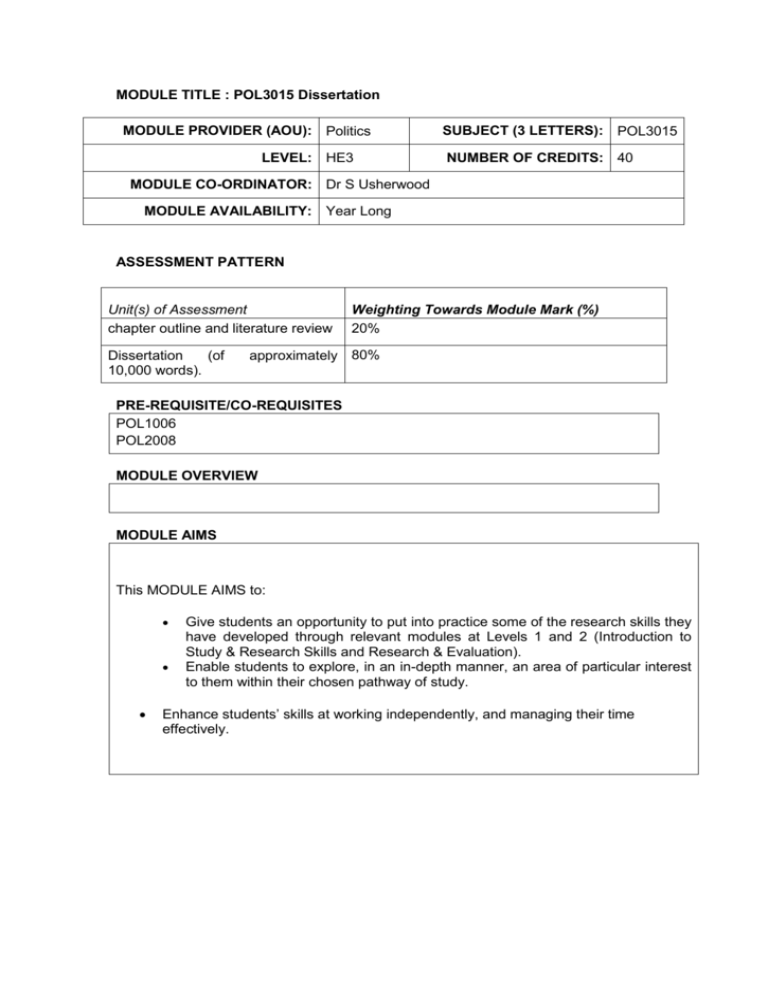
MODULE TITLE : POL3015 Dissertation MODULE PROVIDER (AOU): Politics LEVEL: HE3 SUBJECT (3 LETTERS): POL3015 NUMBER OF CREDITS: 40 MODULE CO-ORDINATOR: Dr S Usherwood MODULE AVAILABILITY: Year Long ASSESSMENT PATTERN Unit(s) of Assessment chapter outline and literature review Dissertation (of 10,000 words). Weighting Towards Module Mark (%) 20% approximately 80% PRE-REQUISITE/CO-REQUISITES POL1006 POL2008 MODULE OVERVIEW MODULE AIMS This MODULE AIMS to: Give students an opportunity to put into practice some of the research skills they have developed through relevant modules at Levels 1 and 2 (Introduction to Study & Research Skills and Research & Evaluation). Enable students to explore, in an in-depth manner, an area of particular interest to them within their chosen pathway of study. Enhance students’ skills at working independently, and managing their time effectively. LEARNING OUTCOMES On completion of this module, students should be able to: Formulate succinct and relevant ‘research questions’ or identify a relevant topic for research. Select research methods appropriate to their research questions and/or topic and use these methods effectively. Critically analyse quantitative and/or qualitative data. Present research findings in an appropriate format, constructing reasoned arguments and exercising critical judgement. Work independently, over a sustained period of time, managing their time effectively. Cognitive Skills Gather, organise and deploy evidence, data and information from a variety of secondary and some primary sources. Construct reasoned argument, synthesize relevant information and exercise critical judgement. Reflect on their own learning and seek and make use of constructive feedback. Manage their own learning self-critically. Engage in interdisciplinary and multidisciplinary debates. Evaluate research material. Transferable skills Communicate effectively and fluently in speech and writing. Use communication and information technology for the retrieval and presentation of information, including, where appropriate, statistical or numerical information. Work independently, demonstrating initiative, self-organization and timemanagement. Deploy a range of relevant research skills Practical skills Make appropriate use of information and communications technology. Manage and manipulate qualitative and/or quantitative data. Employ relevant research skills to investigate a politics- or policy-related area. Access relevant politics- and policy-related datasets and be able to retrieve data from them. MODULE CONTENT Manage their own time effectively The dissertation gives students an opportunity to engage in an extended piece of work and to develop, in a detailed manner, their interests from their chosen pathway of study. The type of dissertation will vary, depending on individual interests, but is likely to follow one of the following patterns – or a combination of them: A piece of empirical research, using the research methods and skills covered by modules at Levels 1 and 2 of the programme. Students may conduct primary research on a politics- or policy-related issue (using methods such as interviews and questionnaires) or secondary research in a similar area (for example, interrogating a pre-existing data set; analysing the images and representations used in a recent election campaign). An action research project, which aims to bring about change in a politics, policy- or citizenship-related organisation in which the student works. This would typically be carried out during the professional placement year, within the placement organisation but in negotiation with the tutor, could also be conducted in another organisation to which the student has some connection, if appropriate. A theoretical piece of work exploring, in considerable depth, one or more of the issues raised by programme modules. For example, a dissertation could analyse, in more depth than would be required for individual modules, the work of one or more political theorists, or theory development around a particular politics- or policy-related theme. It should be noted that students will be expected to choose a substantive topic that fits within their pathway. Students on the generic pathway will not be restrained in this way. Students will be expected to submit a chapter outline during the autumn semester, as well as a literature review during the spring semester. They will receive feedback on both pieces OF andTEACHING/LEARNING their work will contribute towards their final mark. METHODS Independent work, with access to regular one-to-one supervision SELECTED TEXTS/JOURNALS Bell, C. & Roberts, H. (1984) Social Researching: Politics, Problems, Practice. Routledge and Kegan Paul. Blaxter, L., Hughes, C. & Tight, M. (1996) How to Research. Buckingham: Open University Press. Bowell, Tracy & Kemp, Gary (2005) Critical Thinking: A Concise Guide, London: Routledge Bryman, A. (2001) Social Research Methods. Oxford: Oxford University Press. Bulmer, M. (2004) Sociological Research Methods, 3rd ed. Basingstoke: Palgrave Macmillan. Dunleavy, P. (1986) Studying for a Degree in the Humanities and Social Sciences, Basingstoke: Palgrave Gomm, R. (2003) Social Research Methodology. Basingstoke: Palgrave Macmillan. King, R., Keohane, O. & Verba, S. (1994) Designing Social Inquiry: Scientific Inference in Qualitative Research. Princeton University Press. May, T. (2001) Social Research. Issues, methods and process, 3rd ed. Buckingham: Open University Press. McMillan, K & Weyers, J (2007) How to Write Dissertations and Project Reports, Harlow, Essex: Pearson Truman, C. (2004) Social Research and Social Justice. Basingstoke: Palgrave Macmillan
